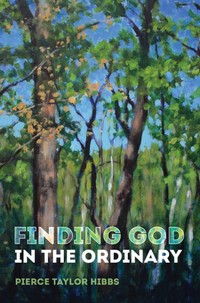 Finding God in the Ordinary
Finding God in the Ordinary
by Pierce Taylor Hibbs
Paperback, 73 pg.
Wipf & Stock Publishers, 2018
Read: August 25, 2019

In the greatness of God, the smallest of things is given tremendous weight.
Hibbs, the associate director of the Theological English Department at Westminster Theological Seminary, has given us a great collection of thirteen essays (semi-inspired by an interview Hibbs heard with Karl Ove Knausgard on NPR but from a very different perspective) based on that idea. As you can guess from the title, Hibbs looks at the minutiae of life and sees how it testifies to the Triune God of the Christian Scriptures.
Some of the everyday, ordinary, common things that he muses on include:
- dust particles
- his son’s laugh
- swirling coffee
- light
- wind
- shadows
- falling snow
Not your everyday subjects for short essays—particularly not from a theologian, are they? From these everyday things, Hibbs goes on to mediate and wax lyrically on God’s nature, being, truth, care, light, providence, and grace (and other things). These are not theological treatises, but musings on small things around him. Yes, they are theologically-inclined and theologically-informed (and he slips in enough nuggets to make me want to check out his other work). I can’t think of anything else to compare it to, which annoys me, because it’d help explain the volume.
I wondered from time to time if he was going to dance close to pantheism, but he never got that close, really. But he was clearly aware of the hazard, and addressed it in his Epilogue.
The prose is frequently poetic (and there are the occasional bits of actual verse), and gorgeously written. It’s not often that you read theologically-inclined books that possess beautiful language—the ideas are often wonderful, sure, but the language typically fails to live up to it. Not Hibbs—he knows how to phrase things to make an impression, not just impart ideas.
Not only are these essays well-written and thought-provoking, they ought to train the reader to start to find God in the ordinary around them—which is probably the best use of the book. It’s a little on the thin side, honestly, but I don’t know if you could read more than this in a sitting (if you manage to only do one sitting of it) without it losing some power. An interview I heard with him seemed to suggest there might be further collections like this, if there are, I will jump on them. Recommended.
—–

![]()



1 Pingback